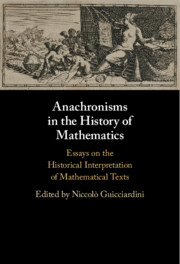 Anachronisms in the History of Mathematics
Anachronisms in the History of Mathematics Book contents
- Frontmatter
- Contents
- Contributors
- Figures
- Preface
- 1 Introduction: The historical interpretation of mathematical texts and the problem of anachronism
- 2 From reading rules to reading algorithms: textual anachronisms in the history of mathematics and their effects on interpretation
- 3 Anachronism and anachorism in the study of mathematics in India
- 4 On the need to re-examine the relationship between the mathematical sciences and philosophy in Greek antiquity
- 5 Productive anachronism: on mathematical reconstruction as a historiographical method
- 6 Anachronism in the Renaissance historiography of mathematics
- 7 Deceptive familiarity: differential equations in Leibniz and the Leibnizian school (1689–1736)
- 8 Euler and analysis: case studies and historiographical perspectives
- 9 Measuring past geometers: a history of non-metric projective anachronism
- 10 Anachronism: Bonola and non-Euclidean geometry
- 11 Anachronism and incommensurability:words, concepts, contexts, and intentions
- Index
4 - On the need to re-examine the relationship between the mathematical sciences and philosophy in Greek antiquity
Published online by Cambridge University Press: 19 July 2021
- Frontmatter
- Contents
- Contributors
- Figures
- Preface
- 1 Introduction: The historical interpretation of mathematical texts and the problem of anachronism
- 2 From reading rules to reading algorithms: textual anachronisms in the history of mathematics and their effects on interpretation
- 3 Anachronism and anachorism in the study of mathematics in India
- 4 On the need to re-examine the relationship between the mathematical sciences and philosophy in Greek antiquity
- 5 Productive anachronism: on mathematical reconstruction as a historiographical method
- 6 Anachronism in the Renaissance historiography of mathematics
- 7 Deceptive familiarity: differential equations in Leibniz and the Leibnizian school (1689–1736)
- 8 Euler and analysis: case studies and historiographical perspectives
- 9 Measuring past geometers: a history of non-metric projective anachronism
- 10 Anachronism: Bonola and non-Euclidean geometry
- 11 Anachronism and incommensurability:words, concepts, contexts, and intentions
- Index
Summary
Scholars tend to assume that the mathematical sciences and philosophy were distinct disciplines in antiquity, as they are today. From the fourth century B.C.E. onward, mathematicians and philosophers did distinguish themselves. They criticized each other’s work and, in some areas of the Greek world, strong rivalries developed between philosophers and mathematicians. I argue, however, that the distinction between philosophers and mathematicians did not entail that their fields of inquiry were distinct. This chapter examines the relationship between the mathematical sciences and philosophy from the perspective of the practitioners of the mathematical sciences, in particular, Archytas of Tarentum, Hero of Alexandria, and Claudius Ptolemy. I argue that these practitioners viewed the relationship between the mathematical sciences and philosophy as more complex, where the mathematical sciences are not only in relation to philosophy but, even stronger, forms of philosophy. Moreover, the mathematical sciences answer some of the most fundamental questions of philosophy, e.g., how to obtain knowledge, how to form a just society, and how to attain the good life.
Keywords
- Type
- Chapter
- Information
- Anachronisms in the History of MathematicsEssays on the Historical Interpretation of Mathematical Texts, pp. 105 - 130Publisher: Cambridge University PressPrint publication year: 2021


